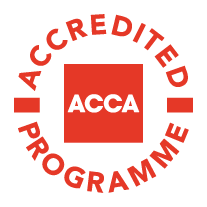

*Average of all questions, excluding Specialists
1. Introduction to Financial Accounting
2. Digital Skills for Accountants
3. Quantitative Methods
4. Introduction to Management Accounting
5. Introduction to Economics
6. Introduction to Sustainability in Accounting
1. Auditing in Context
2. Financial Accounting
3. Taxation
4. Business and Corporate Law
5. Financial Management
6. Management Accounting
Compulsory
1. Corporate Finance
2. Financial Reporting
3. Performance Management and Control
Optional
4. Auditing
5. Personal and Corporate Taxation
6. Analysis Report on Current Issues in Accounting and Finance
7. Blockchain Technologies in Finance
This module builds on knowledge and skills taught at Level 5/Year 2 (Financial Management) and aims to develop the skills expected of a finance manager, in relation to investment, financing, and dividend policy decisions.
The aim of the module is to build and further develop knowledge and skills taught at Level 4/Year 1/Year 1 (Introduction to Financial Accounting) and Level 5/Year 2 (Financial Accounting) in understanding and applying accounting standards and the theoretical framework in the preparation of financial statements of entities, including group entities, and how to analyse and interpret those financial statements.
The module aims to build on knowledge and skills taught at Level 4/Year 1 (Introduction to Management Accounting) and Level 5/Year 2 (Management Accounting and develop knowledge) helping develop skills in the application of management accounting techniques to quantitative and qualitative information for planning, decision-making, performance evaluation, and control.
This module builds on Level 5/Year 2 Auditing in Context and aims to enable you to demonstrate a detailed understanding of auditing principles and procedures applicable to business organisations and to select and apply those procedures in a variety of practical situations.
The module aims to build upon the knowledge and skills gained at Level 5/Year 2 (Taxation) and develop knowledge and skills relating to the tax system as applicable to individuals, single companies, and groups of companies.
The module aims to enable you to engage in a knowledge-based debate with your peers on selected current issues in accounting and finance.
This is not a taught module, it is a research project that focuses on the current issues in the accounting and finance profession.
The module aims to demystify the world of blockchain technology for accountants and will enable you to get to grips with technological advances and digital disruptors, give a clearer understanding of what they mean to the role of a professional accountant, and how to make informed decisions about adopting and using new technologies.
Introduction to Financial Accounting
Written Assignment 40%,
Written Examination 60%
Digital Skills for Accountants
Portfolio 100%
Quantitative Methods
Written Assignment 40%,
Written Examination 60%
Introduction to Management Accounting
Written Assignment 40%,
Written Examination 60%
Introduction to Economics
Written Assignment 40%,
Written Examination 60%
Introduction to Sustainability in Accounting
Artefact 100%
Auditing in Context
Written Assignment 40%,
Written Examination 60%
Financial Accounting
Written Assignment 40%,
Written Examination 60%
Taxation
Written Assignment 40%,
Written Examination 60%
Business and Corporate Law
Written Assignment 40%,
Written Examination 60%
Financial Management
Written Assignment 40%,
Written Examination 60%
Management Accounting
Written Assignment 40%,
Written Examination 60%
Corporate Finance
Written Assignment 40%,
Written Examination 60%
Financial Reporting
Written Assignment 40%,
Written Examination 60%
Performance Management and Control
Written Assignment 40%,
Written Examination 60%
Auditing
Written Assignment 40%,
Written Examination 60%
Personal and Corporate Taxation
Written Assignment 40%,
Written Examination 60%
Analysis Report on Current Issues in Accounting and Finance
Written Assignment 100%
Blockchain Technologies in Finance
Written Assignment 50%
Oral assignment 50%

- Secondary School
Leaving Certificate with average 15/20
AND
- 15/20 in Mathematics on the High School Leaving Certificate or equivalent.
- 15/20 in English on the High School Leaving
- English competency e.g. IELTS 5.5, GCSE C OR equivalent qualification.
Exemptions may be granted on a case by case basis.

3 years

Recognised by UK NARIC and KYSATS. Accredited by ACCA (9 out of 14 Exemptions)